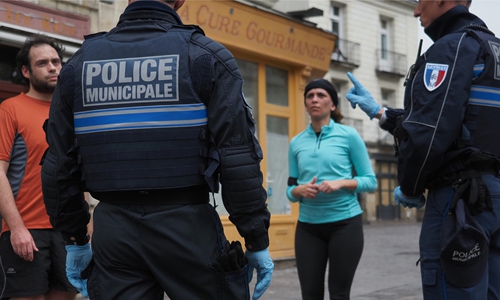
Police officers talk to people in the streets on Tuesday in Tours, France amid the spread of the COVID-19. French President Emmanuel Macron asked people to stay at home to avoid the spread of the virus, saying only necessary trips would be allowed and violators would be punished. Photo: AFP
Stringent movement restrictions, military deployment to help relief hospitals at breaking point, spending billions of euros on helping struggling companies -- this is how France is gearing up to combat the "invisible" coronavirus that has already claimed nearly 150 lives and infected more than 6,600 people in the country.
At 12 noon on Tuesday, new and tough measures to limit gatherings and curb movement came into effect in France. Outdoor meetings are banned, and friendly or family gatherings will no longer be allowed. Parks in the capital city are closed.
People are forced to stay at home. Only journeys for reasons of work, health needs or shopping for necessities are allowed.
"The rule is simple: just stay at home because staying at home today and in the coming days means saving lives," said Interior Minister Christophe Castaner as the lockdown came into force.
As of Monday, 1,210 more people had tested positive for the coronavirus, bringing the total number of infections in the country to 6,633. The number of deaths climbed to 148, up 21 in just a day.
Under the new rules, French citizens who want to travel will need to fill in a document explaining their reasons for doing so and carry it with them. If they are found to have violated the instructions, they risk to be fined up to 135 euros (148.14 US dollars).
Some 100,000 policemen and gendarmes have been mobilized and fixed checkpoints are set up countrywide to guarantee full respect for the containment measures.
France has already ordered the countrywide closure of all public institutions and museums, suspended sporting events, and banned non-essential activities in cafes, restaurants, cinemas and nightclubs.
Despite the measures to counter the spread of the coronavirus, the situation has been deteriorating, health authorities warned, voicing alarm at the apparent lack of concern in the general public.
In a televised speech on Monday evening, President Emmanuel Macron radically tightened the containment measures by imposing a strict lockdown.
"We're not up against another army or another nation. But the enemy is right there: invisible, elusive, but it is making progress," he warned. "I know what I am asking of you is unprecedented, but circumstances demand it."
According to Gilles Pialou, head of the infectious diseases department at Tenon Hospital in Paris, containment is "essential" to slow down the spread of the virus. He said that the president's decision has brought relief to the country's already overburdened hospitals.
"In hospitals, we will manage 20 percent of the problem, which is already a lot, namely the serious cases, resuscitation and protecting health takers. It is the responsibility of society to limit the spread of the virus," he told BFMTV news channel.
Citing "unprecedented circumstances," military forces will be mobilized to help medical staff in the hard-hit eastern Alsace region, where a military hospital with 30 intensive-care beds will be set up.
"In the Grand-Est region, in Mulhouse and in Strasbourg, the situation (in hospitals) is tense. This morning, helicopters from the army's health service were transferring young, seriously ill patients to other hospitals in the region where we have room," Health Minister Olivier Veran told France Inter radio early on Tuesday.
Veran added that at least two weeks of lockdown are needed to stem the contagion and a possible extension would be decided in due course.
"Everyone must understand that we are at war against the virus. There is also a lasting and violent economic and financial war. We must mobilize all our forces, at national, European and at G7 level," Economy and Finance Minister Bruno Le Maire warned on Tuesday.
He announced " immediate financial aid" worth 45 billion euros to help enterprises that risk bankruptcy, in addition to 300 billion euros of state loan guarantees to ensure that no small and medium-sized enterprise faces cashflow problems.
The growth of the French economy is set to shrink by one percent and debt would exceed 100 percent of gross domestic product (GDP) this year, Le Maire told local media. "This is a provisional figure," he added. (1 euro = 1.10 US dollars)
